Farmers share success of Open Farm Sunday 2023
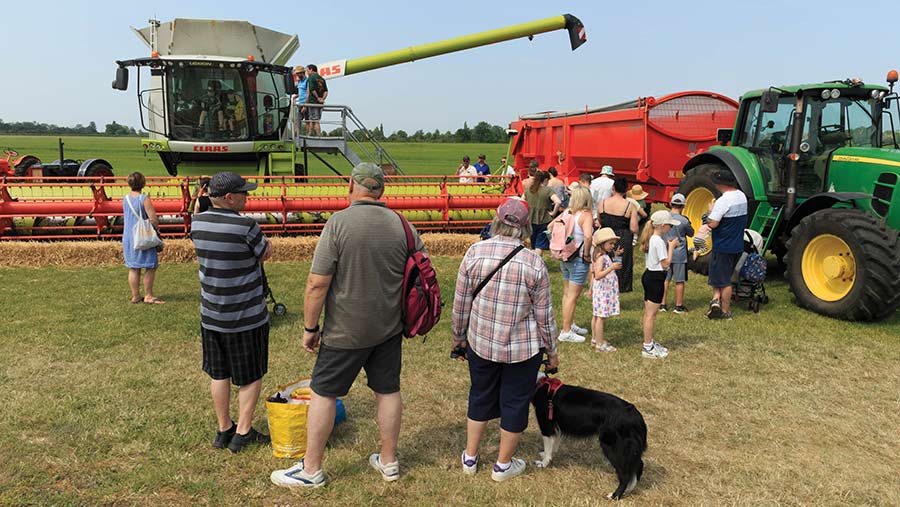 © Tim Scrivener
© Tim Scrivener Since its conception in 2006, the Linking Environment and Farming Open Farm Sunday event has gained traction among farmers across the country.
Now in it’s 17th iteration, this year’s event, which took place on Sunday 11 June, saw more than 250 farmers open their gates to the public, welcoming about 150,000 visitors to gain a vital insight into food production, the environment, and the wider agricultural industry.
See also: How farmers are helping to educate school children about agriculture
Based on previous years’ findings, Linking Environment and Farming (Leaf) says that, after attending an event, more than half of visitors would consider a career in agriculture, while 96% say they have a greater appreciation for the work that farmers do.
Farmers Weekly spoke to some of the participating farmers this year to find out about their Open Farm Sunday (OFS) successes.
Jake Freestone
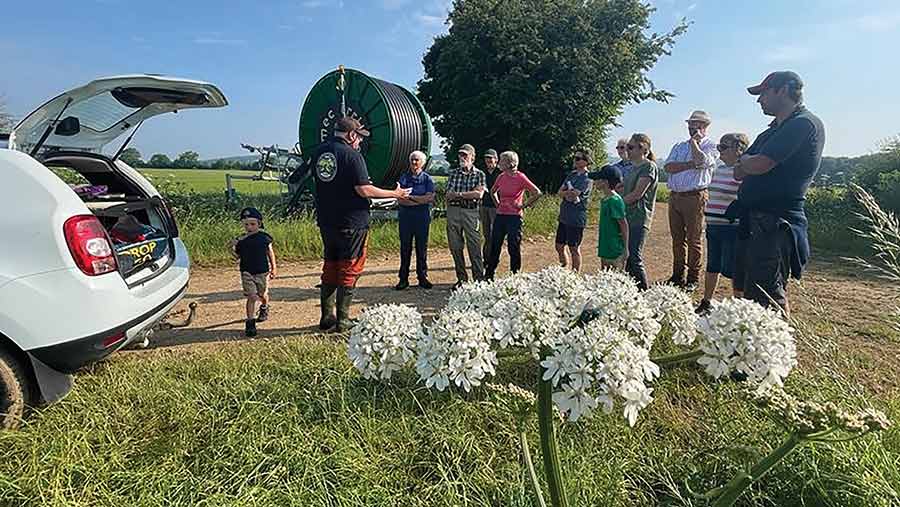
© Jake Freestone
Farming on the Gloucestershire/Worcestershire border, arable and sheep farmer Jake Freestone has been a member of Leaf since 2004, and has taken part in every OFS event since the initiative first started.
“Education, the environment and food production are the three things we really try to focus on, as well as regenerative agriculture,” said Jake. “We like to share this with our local community.
“For us, it’s about telling our story of food production and environmental conservation to neighbours who interact on the farm, walking on the footpaths and bridleways. OFS gives us the opportunity to show them what we’re doing and how we’re doing it.”
Running two tours across the day, Jake had about 25 visitors to the farm, who were able to witness conservation bird ringing, see bee colonies inside a demonstration hive, and discuss the impact of corvids and foxes on the environment.
“It’s an investment in knowledge,” said Jake. “We also spoke a lot about dogs being off leads and how that can have a negative effect on ground-nesting birds.
“It’s about taking responsibility and ownership for the environment you’re in. That investment of half a day setting up is a small price to pay if we can stop a dog getting in with some sheep.”
Bryony Graham
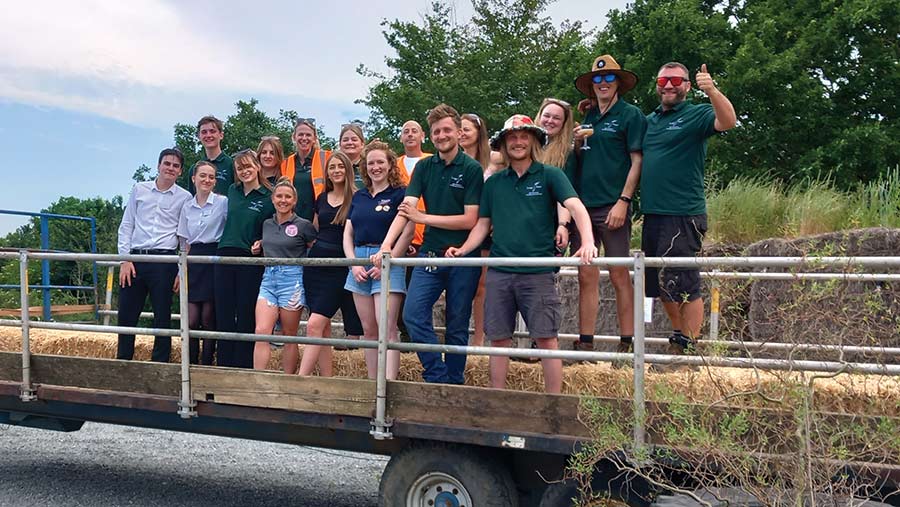
© Leaf
Bryony Graham hosted an OFS event on her 300ha family arable farm in Essex.
“We are one of a diminishing number of farms in the area,” she said. “There aren’t many that are surviving round where we are at the moment.
“We’re so close to London and surrounded by a lot of big towns, so we have something we think is quite powerful to offer in terms of showing people what the countryside looks like and where their food comes from.”
Bryony’s event involved both walking and tractor tours, a machinery display set up with the help of local farmers to show kit from different eras, an activity matching different grains to the foods that they are turned into, and bug catching among the wildflowers.
“We feel quite strongly that there is a lot farmers can do to break down barriers. There’s a real discrepancy between what a lot of people think agriculture looks like, and what intensive agriculture is.
“It’s an opportunity for that kind of communication about how modern farming works in order to produce food to feed people.
“We are opening our doors to be completely transparent about how these things work.”
An unexpected bonus, Bryony said that planning the event also turned into an opportunity to bring local members of the farming community together to help. “That’s been my favourite thing about planning it.”
Nick and Lucy Tyler
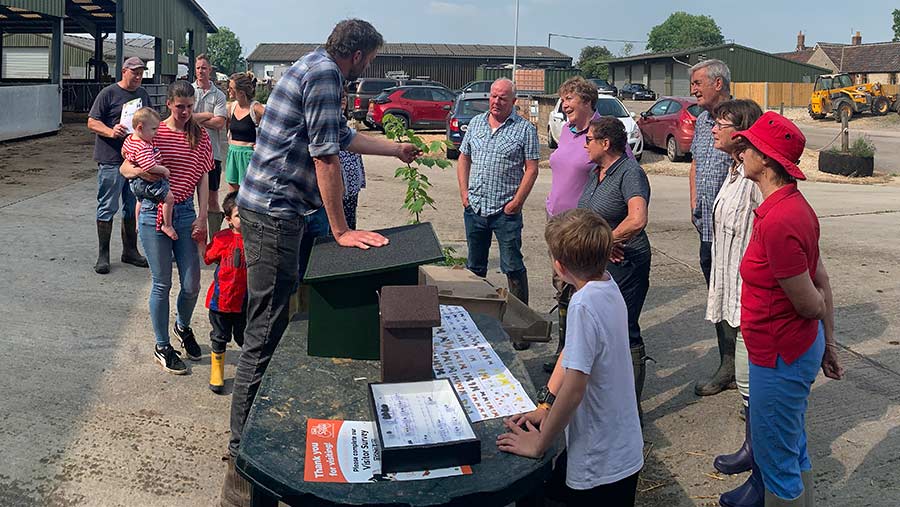
© Leaf
Hosting their first OFS event, Wiltshire-based dairy and wagyu beef farmers Nick and Lucy Tyler said that the day was hugely positive.
Based on their 890ha farm, the pair milk 550 dairy cattle and have 405ha of combinable crops, but their OFS event focused mainly on showing the workings of the dairy.
“Open Farm Sunday is something we had never done before,” said Nick. “We thought we’d give it a go this year and keep it fairly low key.”
After advertising tickets on the local community Facebook page, which were all booked up on the same day, the Tylers were able to arrange two groups of visitors, with about 24 people in each group.
The two-hour tours involved seeing the calves, the milking parlour with cows in the rotary system, and a look at feed rations, giving visitors a chance to see the inside operations of a working dairy.
“There were loads of questions and loads of dialogue,” said Nick. “We had children and adults of all ages.
“The day was really positive and interactive with technical and scientific questions. I think we’re guilty as farmers for assuming the public have an idea of what goes on as they see tractors flying past, but they genuinely didn’t have a clue.
“We get on very well with the village, but the dairy is away from the community and people were amazed, with no idea about the technical elements, the IT, the herd health and environmental stuff.”
Visitors were especially “fascinated” by the electronic identification and cow manager tags, which display temperatures and bulling activities. “One visitor commented at the end of the tour that they didn’t realise that farmers are scientists.”
Luke Abblitt
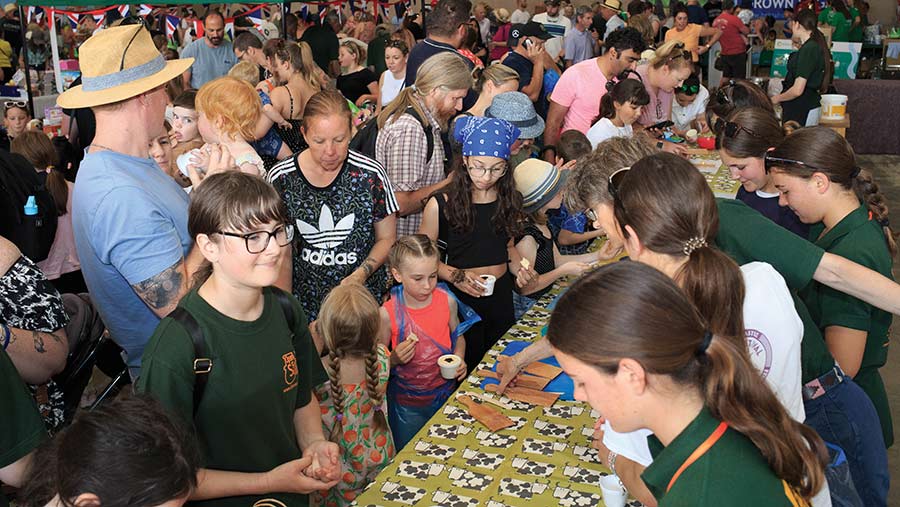
© Tim Scrivener
Farmer and YouTuber Luke Abblitt helped out at the Park Farm OFS event in Thorney, Cambridgeshire. While not hosting an event on his own farm, Luke volunteered to help with the tractor tours and farm safari.
Asked why he had decided to get involved with OFS, he said: “It is such an important initiative to connect everybody with where their food comes from.
“The public can get up close with machines, livestock and crops and look at how we produce food and have the opportunity to speak to farmers.
“Most people don’t connect with their food and the farms that produce it, or they think that farming is backwards and don’t realise the amount of science and technology behind it.
“It’s getting the public on to farms in the right way, with a farmer who can get hands-on and answer any questions,” said Luke.
